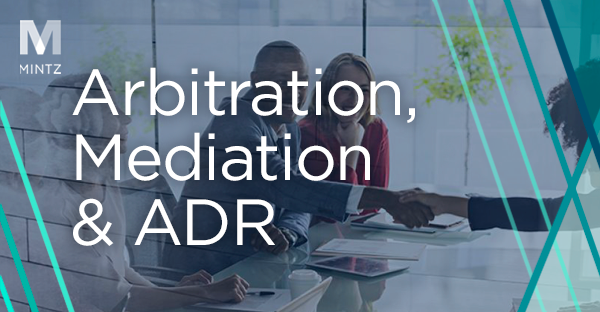
Gilbert Samberg retired from Mintz in 2021. He was previously a Member in Mintz’s Litigation Practice.
viewpoints
The Antecedent Delegation Agreement: “Russian Doll Questions” Concerning a Non-Signatory to an Arbitration Agreement Remain Unresolved
February 17, 2021 | Blog
Recently, the U.S. Supreme Court denied certiorari in Piersing v. Domino’s Pizza Franchising LLC, 20-695 (Jan. 25 2021) and dismissed its own writ of certiorari as “improvidently granted” in Henry Schein, Inc. v. Archer & White Sales, Inc., 592 U.S. ___ (Jan. 25 2021). Both cases concerned a non-signatory of an arbitration agreement seeking to enforce the terms of that agreement against a signatory, including terms that arguably concerned whether arbitrability issues were delegated to an arbitrator for adjudication in the first instance. And both arguably offered true threshold questions in that regard – e.g., who decides the delegation issue itself. Here were opportunities to wrestle with the perplexing Russian (nesting) doll problem.
Read more
Lessons From Above: SCOTUS Declines to Review a Class Arbitrability Case (the Issue Had Been Delegated to an Arbitrator)
November 2, 2020 | Blog
In its restraint, SCOTUS has shown us the mischief that arbitrators may do if parties are lax in setting boundaries in their agreement to arbitrate. By declining to grant certiorari regarding the Second Circuit’s most recent decision in Jock v. Sterling Jewelers, Inc., 2019 U.S. App. LEXIS 34205 (2d Cir. Nov. 18, 2019), cert. den., No. 19-1382, 2020 U.S. LEXIS 4133 (Oct. 5, 2020), SCOTUS reminds us of the significance of the doctrine of judicial deference to the authorized decisions of an arbitrator.
Read more
Into the Fray: Seventh Circuit Holds That Foreign and International Commercial Arbitrations Do Not Receive U.S. Judicial Assistance In Discovery Under 28 U.S.C. §1782(a)
October 6, 2020 | Blog
The Seventh Circuit is the latest Court of Appeals to enter the fray concerning the scope of application of 28 U.S.C. §1782(a), finding additional reasons to hold that a foreign or international commercial arbitration is not a “foreign or international tribunal” for purposes of the statute and hence not entitled to its benefits. See, Servotronics, Inc. v. Rolls-Royce, PLC, 2020 U.S. App. LEXIS 30333 (7th Cir. Sept. 22, 2020). The Seventh Circuit thus joins the Second and Fifth Circuits in so holding, while the Fourth and Sixth Circuits have held to the contrary. Cases teeing up the same issue are pending before the Third and Ninth Circuit Courts of Appeals.
Read more
Del. District Court (Third Circuit) Again Holds That 28 U.S.C. § 1782 Does Not Apply Vis-à-vis Foreign Commercial Arbitrations.
September 23, 2020 | Blog
Congress long ago generously provided for American judicial assistance in obtaining discovery in the United States “for use in a proceeding in a foreign or international tribunal” without requiring reciprocity from the country in which such tribunal is seated. This altruistic legislation, intended as an example (hopefully to be emulated by other countries), is set out in the increasingly popular yet controversial statute, 28 U.S.C. § 1782.
The fly in the ointment regarding this generous legislation, however, is the enduring fundamental issue of whether a foreign or international private commercial arbitration is such a “tribunal” for these purposes. The Circuit Courts of Appeals that have ruled on that issue have split down the middle: the Fourth and Sixth Circuit held relatively recently in the affirmative, while the Second and Fifth Circuits have held just the opposite. (The Second Circuit’s most recent decision in that regard was issued in July 2020, reaffirming its earlier decision in 1999 to this same effect.)
Read more
The fly in the ointment regarding this generous legislation, however, is the enduring fundamental issue of whether a foreign or international private commercial arbitration is such a “tribunal” for these purposes. The Circuit Courts of Appeals that have ruled on that issue have split down the middle: the Fourth and Sixth Circuit held relatively recently in the affirmative, while the Second and Fifth Circuits have held just the opposite. (The Second Circuit’s most recent decision in that regard was issued in July 2020, reaffirming its earlier decision in 1999 to this same effect.)
Enforcement of International Arbitration Agreements: SCOTUS Rules That the New York Convention (and FAA ch. 2) Are Not Preemptively Exclusive
August 7, 2020 | Blog
When all was said and done, the U.S. Supreme Court ruled unanimously on June 1, 2020 in effect that the New York Convention (i.e., the U.N. Convention on the Recognition and Enforcement of Foreign Arbitral Awards) and the Federal Arbitration Act (“FAA”) ch. 2, which implements its enforcement in the U.S., are not preemptively exclusive law concerning the enforcement of international arbitration agreements. See GE Energy Power Conversion France SAS v Outokumpu Steamless USA, LLC, 2020 U.S. LEXIS 3029 (U.S. June 1, 2020).
Read more
28 U.S.C. §1782(a): Second Circuit Reinforces Appeals Court Split Concerning Applicability to Private Commercial Arbitrations
July 16, 2020 | Blog
Just as the jurisprudential pendulum appeared to be swinging smoothly in one direction, the Second Circuit declined to get on board and instead pushed back to the future on July 8, 2020 in holding that federal courts may not order discovery, under 28 U.S.C. §1782(a), in support of a foreign private commercial arbitration. See, Hanwei Guo v. Deutsche Bank Securities, Inc., 2020 U.S. App. LEXIS 21219 (2d Cir. July 8, 2020). It thus reaffirmed its 1999 decision in National Broadcasting Co. v. Bear Stearns & Co., 165 F.3d 184 (2d Cir. 1999).
Read more
“Two-Tier” Arbitration: Progress in Enforcement of International Arbitral Awards in India
June 23, 2020 | Blog
Here is reason for hope for those who face with trepidation the prospect of enforcing an international arbitration award in India. On June 2, 2020, the Supreme Court of India (“ISC”) confirmed the enforceability there of a foreign arbitral award that was rendered in accordance with a “two-tier arbitration” agreement. Among other things, the court rejected the dreaded catch-all “Indian public policy” defense as raised by the respondent. This is the latest in what seems to be a trend of pro-arbitration enforcement decisions by the ISC, and may help to alleviate some of the many anxieties concerning the enforceability generally of international arbitral awards in India.
Read more
Arbitration Subpoenas: Jurisdiction and Venue Basics for Enforcement Made Simpler
May 28, 2020 | Blog
The statutory mechanism for judicial enforcement of an arbitration “subpoena” – in actuality, an arbitrator’s summons to give evidence -- is simply by petition to “the United States District Court for the district for which such arbitrators, or a majority of them, are sitting….” Federal Arbitration Act (“FAA”) § 7, 9 U.S.C. § 7. But U.S. law regarding the limited subject matter jurisdiction of its federal courts, coupled with Congress’ omission to provide for such jurisdiction in chapter 1 of the FAA, makes for significant potential complexity at the threshold of enforcing an arbitral subpoena issued in connection with a domestic arbitration. Fortunately, the Second Circuit Court of Appeals recently simplified such matters a bit.
Read more
Is the “Clear and Unmistakable” Hurdle for Delegation of Arbitrability Issues to an Arbitrator Uniform or Variable?
May 14, 2020 | Blog
The United States Supreme Court established that questions of arbitrability are presumptively for a court unless the parties clearly and unmistakability manifest their intention (i.e, agreement) that such issues should be determined by an arbitrator in the first instance. But is the “clear and unmistakable” standard uniform in all circumstances or variable?
Read more
The Mischief That Arbitrators May Do: Clause Construction Award Enables Class Arbitration
April 29, 2020 | Blog
If we needed a reminder of why the “delegation” question – i.e., whether parties have agreed that gateway arbitrability issues should be adjudicated in the first instance by an arbitrator rather than by a court – is important, a recent decision by the Fifth Circuit Court of Appeals should do in the trick. In Sun Coast Resources, Inc. v. Conrad, 2020 U.S. App. LEXIS 12149 (5th Cir. April 16, 2020), an arbitrator had issued a “clause construction award” to the effect that an arbitration agreement that did not mention class or collective arbitration nonetheless permitted it, and the Court held that there was no turning that train around.
Read more
News & Press
In an article published by Law360, Mintz Member Gilbert Samberg offered insights on why the U.S. Supreme Court might take up a case that arguably presents the issue of whether parties that have incorporated certain arbitral rules into their contracts have “clearly and unmistakably” agreed that an arbitrator, rather than a court, shall determine whether a matter must be arbitrated or litigated.
Prominent U.S. Appeals Court Affirms the Extraterritorial Reach of U.S. Evidence Disclosure Statute (28 U.S.C. § 1782)
February 24, 2020
In an article published by Legal Era Magazine [India], Mintz Member Gil Samberg provided insight into the increasingly popular U.S. federal statute concerning cross-border judicial assistance, 28 U.S.C. § 1782, and described a recent Second Circuit decision that expanded the reach of this discovery mechanism to evidence held outside the borders of the United States.
Mintz Member Gilbert Samberg Authors Two Bloomberg Law Articles on Class Arbitration Awards
January 3, 2020
Mintz Member Gilbert A. Samberg authored two articles, published recently by Bloomberg Law, that addressed a fundamental question concerning the legal viability of “class arbitration”: whether an arbitrator can issue an award that binds a person who is not a party to or otherwise deemed by law bound by the bilateral arbitration agreement upon which the arbitral proceeding and the arbitrator’s authority are founded—e.g., a non-appearing non-party putative class member.
A Better Specific Jurisdiction Test For Cross-Border Discovery
November 11, 2019
Mintz Member Gilbert Samberg authored this expert analysis article published by Law360 evaluating a federal statute concerning cross-border judicial assistance, Title 28, Section 1782 of the U.S. Code, which enables a district court to order a person that resides or is found within its jurisdiction to produce evidence for use in a proceeding in a foreign or international tribunal.
What is a Reasoned Award?
October 3, 2019
Mintz Member Gilbert Samberg authored an article published in the September 2019 edition of The Arbitrator, a quarterly newsletter from the Society of Maritime Arbitrators, which explained the significance of a “reasoned award” in arbitration agreements.
The Future Of Int'l Mediation After The Singapore Convention
August 29, 2019
In this Law360 expert analysis column, Mintz Member Gilbert Samberg examines the principal details of the Singapore Convention, which aims to make mediated international settlement agreements as easily enforceable as international arbitration awards now are under the New York Convention.
“Interim Measures” in Arbitration: Requiring Pre-Hearing Security for Payment of an Eventual Final Award
July 12, 2019
The Journal of Consumer & Commercial Law republished a blog post authored by Mintz Member Gilbert Samberg that addressed interim measure awards in arbitration.
Mintz Member Gilbert Samberg authored an expert analysis article published by Law360 that examined competing legal factors facing insurance arbitration disputes.
Arbitration Law And Jury Demands: Devil Is In The Details
March 25, 2019
Mintz Member Gilbert Samberg has authored this article addressing jury demand concerning issues under the FAA relating to arbitrability.
Rethinking Who Decides Gateway Arbitrability Issues
January 18, 2019
Hong Kong Rules Foster Collective, Opt-In Class Arbitration
November 15, 2018
Gil Samberg, a New York-based Mintz litigator, authored this Law360 "Expert Analysis" column discussing new rules from the Hong Kong International Arbitration Center which provide noteworthy institutional means for joinder of parties and consolidation of proceedings so as to effectuate collective or opt-in class arbitration proceedings.
Class Arbitrability Questions After 11th Circ. JPay Ruling
October 16, 2018
New York Litigation Member Gil Samberg authored this Law360 column taking an in-depth look at whether the Eleventh Circuit’s recent decision in JPay v. Kobel correctly addressed the issue of “clear and unmistakable” consent when it comes to the delegation of class arbitrability. Gil further addresses another issue relating to the decision with respect to many class arbitration-related matters
This Law360 Expert Analysis column, authored by New York Litigation Member Gil Samberg, notes that the U.S. Supreme Court will decide next term whether an arbitration agreement that says nothing about class arbitration can be interpreted to constitute consent by the parties. Gil’s column states that it is currently unclear if the Supreme Court will specify who can actually decide that question.
Kavanaugh's Views On Arbitration Could Soon Be Tested
July 25, 2018
This feature article discusses U.S. Supreme Court nominee D.C. Circuit Judge Brett Kavanaugh's track record on international arbitration. New York Litigation Member Gil Samberg is among those sources quoted in the piece.
Delineating When Arbitrability May Be Delegated
June 22, 2018
Validity, enforceability and scope of an arbitration agreement are "gateway" arbitration issues that can be delegated to an arbitrator if the agreement clearly and unmistakably indicates the parties’ intention to do so. New York Litigation Member Gil Samberg authored this “Expert Analysis” column discussing the questions that arise when one of the named arbitration parties is not a signatory of the agreement.
This column is authored by New York Litigation Member Gil Samberg. In the piece Gil discusses why parties should consider incentivizing an adversary with a “sealed settlement offer,” which could eventually make a settlement offeree pay a heavy price in such costs for miscalculation or intransigence.
2nd Circ. Courts Dive Into 'Class Arbitration' Questions
February 15, 2018
Gil Samberg, a Member in Mintz’s New York office, published an article in Law360 on February 15th on the recent efforts made by Second Circuit courts to begin grappling with issues surrounding the viability of class arbitration in U.S. jurisprudence, something the Supreme Court has yet to do.
Hot-Tubbing of Experts in Arbitration
August 28, 2017
Gil Samberg, a Member of the Litigation Practice in Mintz’s New York office, authored an article on how the “hot-tubbing” of experts – “a procedure for the contemporaneous presentation of competing expert oral testimony” – is now a fairly standard consideration in arbitrations.
Gil Samberg, a Member of the Litigation Practice in Mintz’s New York office, authored a Law360 article in conjunction with a recent series of questions asking whether class arbitration is ultimately viable in U.S. court proceedings.
The Current State Of 'Class Arbitration' Law
June 12, 2017
Gil Samberg, a Member of the Litigation Practice in Mintz’s New York office, authored a Law360 article as part of a series asking whether ‘class arbitration’ is ultimately viable, an issue that has yet to be addressed by the U.S. Supreme Court.
Bloomberg BNA Class Action Litigation Report Class Arbitration: Business Kryptonite or ADR Unicorn?
May 2, 2017
This article notes that it's common for consumer and employment contracts to have arbitration clauses that require any dispute to be resolved in binding arbitration. It further discusses how not all such clauses explicitly ban arbitration on a classwide basis.
Is 'Class Arbitration' An Oxymoron?
April 23, 2017
Mintz Litigation Member Gilbert Samberg authors this column asking the question if “class arbitration” is viable given the essential nature of arbitration, or is it an oxymoron.
Applying 28 USC § 1782 In The 2nd Circ.
January 23, 2017
New York Litigation Member Gil Samberg discusses the applications and ramifications of 28 USC § 1782 after a decision in Second Circuit Courts, holding that the London Maritime Arbitration Association is a “foreign tribunal” within that law.
Rules of the Road for Using Experts in International Arbitration
December 21, 2016
Gil Samberg, a Mintz Member, authored an article in Corporate Counsel discussing the complexity of acquiring expert evidence in arbitration disputes. Gil addresses how one must plan accordingly for that expense and difficulty.
Drafting A Sensible And Effective Multistep ADR Provision
December 12, 2016
Gil Samberg, a Member of Mintz's Litigation Practice, published an article in Law360 providing “practical advice regarding factors to be accommodated in fashioning multistep alternative dispute resolution (ADR) provisions.”
Pros And Cons Of Hot-Tubbing In International Arbitration
December 1, 2016
Gil Samberg, a Member of the Mintz Litigation Practice, authored an article in Law360 discussing “hot-tubbing” – a procedure for the joint presentation of expert testimony. Gil weighs in on the pros and cons of this procedure in international arbitrations.
Events & Speaking
Speaker
Read less
Sep
19
2016



